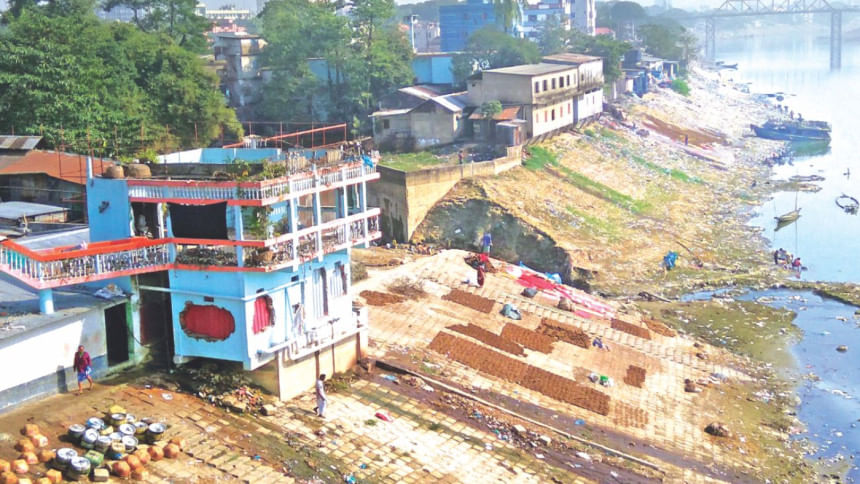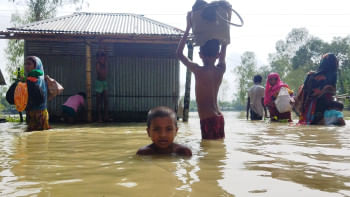Still there, poisoning the Surma

In the middle of 2016, a two-story building on the east side of the Surma river, near the Kazirbazar bridge in Sylhet city, was constructed.
What looked like a recreational spot on the river bank was actually a bathroom/rest area for the fish traders of Kazirbazar.
There were eight such toilets inside the structure and the waste was being directly released into the river through pipes.
The toilets were built by Kazirbazar Fisheries Agent Association (Kazirbazar Matsya Arotdar Samity). The association leaders said they had built the toilets for the wholesale fish traders in the area, so that they could take breaks in between work.
They also claimed they constructed the building and the toilets on their own land.
The move was highly criticised and protested. Following the outburst, the Sylhet District Administration on October 5 that year started demolishing the structure.
The Daily Star published three reports highlighting the issue. The first report, “Toilets occupying river land a new way to kill Surma”, was published on September 10, 2016 and a follow up, “Toilets still there”, on September 30. The last report, “Removed finally”, was published on October 5.
Even though the district administration started dismantling the structure, they left the job unfinished. As a result, the toilets are still there and being used by the fish traders.
While visiting the area on Sunday afternoon, this newspaper saw that the traders were using the toilets frequently while the waste was being released into the river.
The building looked shabby. Some parts of it, smashed during the eviction drive, were covered with blankets. This newspaper tried to talk to the traders while they were stepping out of the facility but they walked away.
Contacted, Jahangir Alam, general secretary of Kazirbazar Fish Traders' Association, said some of the traders were using the toilets. When asked about the river pollution, he evaded the question.
According to the green activists, river banks cannot be sold. As per the Land Management Manual, no one is allowed to construct a building on the river banks, let alone toilets.
When Jahangir was asked about the above, he refused to talk anymore.
Abdul Karim Kim, Surma river waterkeeper, said, “The administration did not demolish the building completely. They did a haphazard job, broke some of the windows and left.”
Utilising the situation, the traders started using it again, said Kim, also general secretary of Bangladesh Poribesh Andolon, Sylhet chapter.
He demanded that the administration take quick action under the National River Protection Commission Act 2013.
Abdul Hye Al Hadi, chief executive, Save the Heritage and Environment, said the toilets were built violating the existing environment rules and under the nose of the administration.
Ashraful Kabir, coordinator of Bhoomishontan Bangladesh, also criticised the administration for not dismantling the toilets.
Sharif Jamil, joint secretary of Bapa, Sylhet, said river encroachment in the country is no longer considered a crime. Many a times, the government has declared to protect the rivers but to no avail. The Surma is also under a constant threat of pollution.
Meanwhile, locals are irked too.
Subinoy Das, a day labourer, said, “We take baths in the river everyday, but the water is becoming dirty.”
Shafiul Alam, a resident of Kazirbazar area, said the stench of human waste fills the air in the area making it unbearable for people to walk beside the river.
“The immediate past deputy commissioner said he would demolish the toilets right away. But nothing happened yet. We urge the authorities concerned to demolish it permanently,” said Sharif Jamil, joint secretary of Bapa.
Contacted, DC Rahat Anwar, who took charge in 2017, said he was not aware of the matter. “I will take initiatives after an investigation.”
Ariful Haque Choudhury, mayor of Sylhet City Corporation, said, “Dumping of waste has become a serious threat to the Surma. Also, grabbing of river land is worsening the situation. We are continuing our drives to save the water bodies.”
When asked about the toilets, he said, “I don't know the details... We will look into the matter.”

 For all latest news, follow The Daily Star's Google News channel.
For all latest news, follow The Daily Star's Google News channel. 



Comments